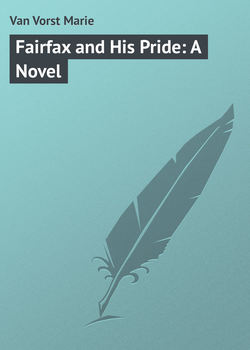Читать книгу Fairfax and His Pride: A Novel - Van Vorst Marie - Страница 7
BOOK I
THE KINSMEN
CHAPTER VII
ОглавлениеHe succeeded in keeping from the kind and curious interest of the little ladies the state of his mind and his pocket, and his intentions. It had not been easy, for when their courteous hints brought no satisfaction, Miss Eulalie and Miss Mitty asked Fairfax out boldly what he "was going to do"? Miss Mitty, on whom the task of doing up the hall room had fallen, dreamed over the sketches she found (in his valise). Spellbound, she held in her hand a small head of a dryad, and modestly covered up with her handkerchief a tiny figure whose sweet nudity had startled her. Antony parried questions. He had come to seek Fortune. So far it rolled before him with the very devil in its tantalizing wheel, but he did not say this to Miss Whitcomb. Miss Eulalie suggested to him that his uncle "could make a place for him in the bank," but Fairfax's short reply cooled her enthusiasm, and both ladies took their cue. In the first week he had exhausted his own projects and faced the horrible thought of disaster.
His nature was not one to harbour anything but sweetness, and the next day, Sunday, when the sunlight poured upon New York, he thought of the little cousins and decided to accept his aunt's invitation. The sky was cloudless and under its hard blue the city looked colder and whiter than ever. It was a sky which in New Orleans would have made the birds sing. The steeples sang, one slender tower rocking as its early ringing bells sang out its Sunday music on the next corner of the street, and Antony listened as he dressed, and recognized the melody. He found it beautiful and sang in his young voice as he shaved and tied his cravat, and made himself impeccable for the Presbyterian Church. His own people were High Church Episcopalians, and from the tone and music of these bells he believed that they rang in an Episcopal building. There was no melancholy in the honied tone of the chime, and it gave him a glow that went with him happily throughout the dreary day.
He found himself between the children in the deep dark pew, where the back of the seat was especially contrived to seize the sinner in a sensitive point, and it clutched Antony and made him think of all the crimes that he had ever committed. Fortunately it met Bella and Gardiner at their heads. Antony's position between the children was not without danger. He was to serve as a quieter for Bella's nerves, spirits and perpetual motion, and to guard against Gardiner's somnolence. He remained deaf to Bella's clear whispers, and settled Gardiner comfortably and propped him up. Finally the little boy fell securely against the cousinly arm. At the end of the pew, Mr. and Mrs. Carew were absorbed, she in her emotional interest in the pastor, a brilliant Irishman who thundered for an hour, and Mr. Carew in his own importance and his position. Antony remembered Miss Mitty and that his uncle was a pillar of the Church, and he watched the pillar support in grave pomposity his part of the edifice.
But neither time nor place nor things eternal nor things present affected the little girl at Antony's side. Sunk in the deep pew, unobserved and sheltered by Antony's figure, she lived what she called her "Sunday pew life," lived it as ardently as she did everything. After a short interval in which she pored over the open hymnbook, she whispered to him —
"Cousin Antony, I have learned the whole hymn, ten verses in five minutes. Hear me."
He tried to ignore her, but he was obliged to hear her as with great feeling and in a soft droning undertone she murmured the hymn through.
"'Abide with me, fast falls the eventide.' Isn't it perfectly beautiful, Cousin Antony?"
This done, she took off her yellow kid gloves carefully, finger by finger, and blew them out into a shapely little hand like Zephyr's, to the dangerous amusement of a child in the next pew. Antony confiscated the gloves. By squeezing up her eyes and making a lorgnon of her pretty bare hand, Bella scrutinized the solemn preacher. Antony severely refused her pencils and paper and remained deaf to her soft questions, and, thrown on her own resources, Bella extracted her father's huge Bible from the rack and, to Fairfax's relief, with much turning of the leaves she finally found a favourite chapter in Revelation and settled down and immersed herself in the Apocalypse. She read with fervour, her bonnet back on her rebellious hair, her legs crossed in defiance of every rule of polite demeanour. Something of the sermon's eloquent, passionate savagery was heard by Fairfax, and at the close, as the preacher rose to his climax, Bella heard too. At the text, "There shall be no more night there, neither candle nor light of the sun," she shut her book.
"He is preaching from my chapter, Cousin Antony," she whispered; "isn't it perfectly beautiful?"
Fairfax learned to wait for this phrase of hers, a ready approval of sensuous and lovely and poetic things. He learned to wait for it as one does for a word of praise from a sympathetic companion. Gardiner woke up and yawned, and Fairfax got him on his feet; his tumbled blonde head reached just to the hymnbook rail. He was a pretty picture with his flushed soft cheeks, red as roses, and his sleepy eyes wide. So they stood for the solemn benediction, "The love of God … go with you … always."
